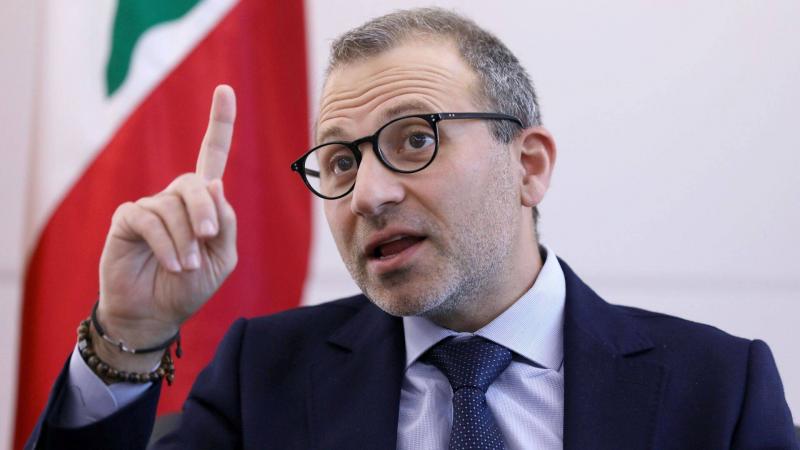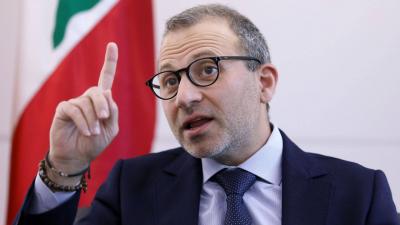Opposition leadership sources interpret the positions of the head of the "Free Patriotic Movement," MP Gibran Basil, as shared on the Hezbollah-affiliated channel Al-Manar, as indicative of his refusal to accept that he is out of the running for the presidency. Despite denying his candidacy, he presented a presidential program that officially requested to join his ally "Hezbollah." This comes in light of his determination to marginalize potential candidates from the first category of civil servants, including Chief of Staff General Joseph Aoun, President of the Supreme Judicial Council Judge Suhail Aboud, and Central Bank Governor Riad Salameh. Additionally, he has sought to cut off the path for former MP Sleiman Frangieh, leader of the "Mard" movement, under the pretext that he does not represent a significant parliamentary bloc and that there are disagreements between them on internal issues.
The opposition sources firmly assert that Basil's declarations are aimed at sabotaging the presidential elections, and point out that he has trapped himself in a contradiction by denying his candidacy for the presidency while asserting that he is the natural candidate, even if his name has not been put forward. They note that he could potentially agree with "Mard" or the "Lebanese Forces" on a specific candidate but emphasizes his main role as the frontrunner in the presidential battle.
Basil's claim that the powers of the president do not transfer to the caretaker government is met with skepticism by the opposition. They argue that, according to the constitution, there is no prohibition on the transfer of presidential powers at the end of a president's term, even to a caretaker government. They highlight that the presidential powers conclude as soon as the term ends, pointing to the precedent when President Amin Gemayel assigned the caretaker responsibilities to a military government led by General Michel Aoun, who later violated constitutional norms by managing the country's affairs from the presidential palace instead of vacating it until a new president was elected.
The sources add that Aoun, at that time, obstructed the holding of parliamentary sessions to elect a new president and was ultimately forced to leave the presidential palace and seek refuge at the French embassy due to pressures from the Syrian military operation. They assert that Aoun now has no option but to vacate the presidential palace upon the end of his term, aware of the local and international responses should he fail to fulfill his promise to leave the palace by midnight on October 31.
The sources indicate that Aoun's previous tenure in Baabda while commanding the military complicates demands for him to evacuate, as the army was under his command amidst a sectarian civil war supported by some Arab nations opposing the Syrian regime. They also mention Aoun's current external and local isolation, noting that only "Hezbollah" and the Iranian-backed "Resistance Axis" stand by him, making it likely that he will have to vacate Baabda, especially with orders potentially being given to the Republican Guard not to take orders from him as he is no longer the commander-in-chief of the armed forces.
They insist that nothing in the constitution states that the powers of the departing president transfer to the prime minister, whether a caretaker or a fully-formed government. They reveal that PM Tammam Salam continued to head the government after President Michel Suleiman's term ended, refusing to go to the presidential palace at the request of the palace's director in the absence of the president due to the failure to elect a new one, preferring instead to exercise his powers from the Prime Minister's Office.
Thus, those who threaten the continuation of Aoun in Baabda after his term ends, under the pretext of an inability to elect a new president, will find themselves mistaken. It is not permissible to embroil the country in a political adventure like Aoun’s military government experience that could put him at odds with the international community and the majority of Lebanese and political forces, which could embarrass Hezbollah as no one dares lead the country into a dangerous vacuum relying solely on the party's overwhelming power, even if its sources deny such a charge, stressing their commitment to ensuring the elections occur as scheduled.
Hence, the sources conclude, Basil is still playing his last card to prevent his exclusion from the presidential race, politically positioning himself under "Hezbollah's" umbrella, hoping to rearrange the presidential dynamics without neglecting to submit his credentials to the Syrian regime, expressing his readiness to visit Damascus while acknowledging Iran's role in the region. Moreover, he competes with his rivals by claiming to lead the largest parliamentary bloc, enabling him to reiterate Aoun's theory that the strongest in his sect should assume the presidency, despite his evasiveness concerning the specifications set by Maronite Patriarch Bechara al-Rahi regarding the next president by questioning the reasons behind the strongest candidate being sidelined.




